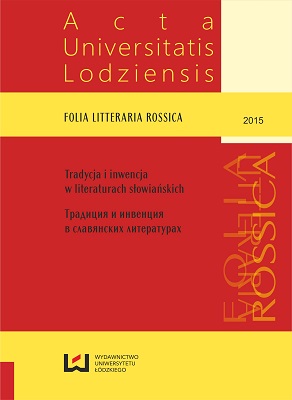Between the ‘Useful’ and the ‘Unprofitable’ Reading: Mikhail Voskresensky and Pushkin’s “Eugene Onegin”
DOI:
https://doi.org/10.18778/1427-9681.S.2015.21Keywords:
fiction, classics, ‘unprofitable reading’, ‘serious literature’, parody, imitation, Eugene Onegin, Pushkin, Eugene Velsky, Mikhail VoskresenskyAbstract
On the material of the novel in verse Eugene Velsky (1828 – 1832) by Mikhail Voskresensky the author of the paper traces the dynamics of how ‘second-rate’ literature assimilates the achievements of the classics – by means of parody and imitation on the one hand, and by lyrical processing of the material – on the other. The author puts forward the idea that the ambiguous reception of Pushkin’s Eugene Onegin in its ‘double,’ Eugene Velsky, is a regular phenomenon. In his transposition of Onegin Voskresensky applied techniques of writing typical of the ‘easy reading’ literature, but he could not reconcile them with the universal humanist reflection which he also included. Aware of the imperfection of his poetic experiments, Voskresensky sought to support his endeavours with the authority of the great poet himself, by referring to the human right to leave behind an ‘inconspicuous trail’, mentioned in Onegin. Thus, the case in hand corroborates Eliza Małek’s thesis about the ‘counterpoint’ character of the development of literature, ‘from the beneficial to the amusement and fun.’ The differentiation in writers’ preferences between the fields of ‘serious’ and ‘entertaining’ literature proves ‘difficult’ within the framework of the dual process of the development of the classics and low-brow fiction in their constant interaction.
Downloads
Downloads
Published
How to Cite
Issue
Section
License

This work is licensed under a Creative Commons Attribution-NonCommercial-NoDerivatives 4.0 International License.












